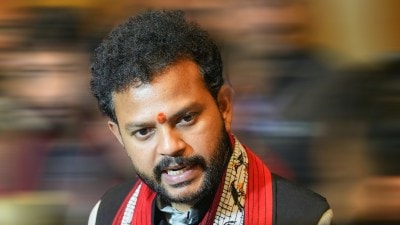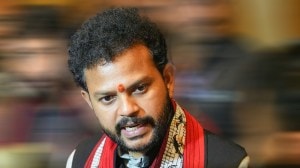THE world’s “largest political party”, as it calls itself, the BJP is aiming higher in seeking to take its membership to 10 crore by the end of an ongoing drive. However, as it becomes the dominant dispensation across large swathes of the country, the BJP’s other definition of itself, as “the party with a difference”, has seen moderation.
It earned that distinction for both its cadre-based structure and internal discipline, as well as strong leaders at all levels and the absence of a centralised command.

While the BJP retains a lot of that character, especially in its strong grassroots network, say leaders, there is little doubt that all power in the party now flows from the top in Delhi.
More than six months after the 18th Lok Sabha was formed, the BJP Parliamentary Party has not met once. With many articulate stalwarts in the ranks, this forum once saw vibrant interactions. The only such meeting of BJP MPs was in June, when they met under the umbrella of the NDA – short of a minority in the Lok Sabha now, the BJP is dependent on NDA partners at the Centre.
Even meetings of the BJP Parliamentary Board, the apex decision-making body that used to meet for every crucial decision, including to pick chief ministers, have become rare. The CMs are now chosen by the top leadership, and the decision communicated to the legislative party. This was on display after the BJP’s Assembly wins in Rajasthan, Madhya Pradesh and Chhattisgarh last year, when the party picked absolute surprises to hold the top posts.
Lately, even the BJP’s Central Election Committee (CEC), the top body that selects candidates for polls, has not been meeting often. The first list of 29 names for Delhi was announced without the CEC meeting even once. Sources said that in “a departure from procedure”, a file of names was rotated among CEC members instead, with the list rushed out in time for Prime Minister Narendra Modi virtually launching the BJP campaign in Delhi.
For Jharkhand and Maharashtra Assembly polls, the CEC met only once, unlike the usual practice of a meeting before the release of every list. Party insiders say that instead of CEC meetings, there were multiple “internal meetings” before the list went to Modi for “final clearance”.
Story continues below this ad
Party leaders say the final call is Modi’s, while crucial appointees to organisational posts also carry Union Home Minister Amit Shah’s stamp.
With Modi’s popularity still the BJP’s trump card across elections, party cadres don’t have a reason to complain. However, certain quarters feel that, in the long run, the “concentration” of power is hurting the party – apart from depriving the BJP of its core strength of influential leaders at every rung.
Modi himself is one example, having risen to the top after long years as Gujarat CM. His contemporaries at that time included names such as Shivraj Singh Chouhan in Madhya Pradesh, Vasundhara Raje in Rajasthan, Raman Singh in Chhattisgarh and B S Yediyurappa in Karnataka.
Of the new crop of CMs, most take their cue from the Centre, say party leaders. “They simply follow directives from Delhi,” a leader said, adding that the few BJP CMs now with an independent standing of their own are Yogi Adityanath (Uttar Pradesh), Himanta Biswa Sarma (Assam) and Devendra Fadnavis (Maharashtra).
Story continues below this ad
In the BJP organisational polls, which are currently on, the emphasis is on “consensus”. As per the BJP constitution, the party president is elected by an electoral college consisting of BJP National Council members and members of state councils, with elections prescribed for everything from local committees to mandal and district panels.
But, senior BJP leader Satish Punia, the in-charge of elections in Haryana for the BJP, told The Indian Express that consensus was “preferred” when it came to mandal, booth and zilla committees. That didn’t mean there was no choice, he said. “We have an internal democratic pattern, where the choice is by common consensus.”
The process is not without hiccups, though. In Goa, a section of the BJP leaders recently protested that most of the chosen mandal presidents were either protégés of ministers or MLAs, or backed by them.
In Madhya Pradesh, the process of selection of zilla presidents, which was expected to be completed by December, has been delayed reportedly due to the lack of consensus among leaders. Senior party leaders had a meeting with probable candidates for district presidents recently to break the stalemate.
Story continues below this ad
In Kerala, mandal committee presidents were chosen on “group basis” and Pathanamthitta and Kollam districts witnessed tension as a section of the leaders accused the official faction of deciding unilaterally. “The fight in these districts became public and the local media reported them. It was embarrassing for the party,” a state leader said, adding that this showed the failure to “exercise a proper democratic process”.
To many BJP leaders, the worry is that the party’s course has started mirroring the Congress’s. “The Congress started disintegrating when its high command in New Delhi became extremely powerful, leaving the state leadership handicapped… In the 1970s and 1980s, the Congress relied solely on its central leadership, Indira or Rajiv Gandhi, to win,” a party leader said, pointing out that the Congress fortunes have been sliding since their passing.
Another leader said: “Earlier we used to identify such issues as Congress issues. But now we realise it’s related to power, not with any individual or parties.”
At the same time, the BJP’s talent-spotting process remains robust in a way that the Congress has struggled to nurture, particularly when it comes to the grassroots and ordinary workers who don’t have any political legacy.
Story continues below this ad
“No other party has the kind of cadre movement that happens in the BJP. The Left too could claim grassroot democracy, but its presence is minuscule now,” said a party leader.
Even if the booth committees and presidents are picked without elections and by consensus, the leader added, “the presence of multiple booths and committees is a testimony to the democratic process, because it involves many… The constitution of the committees itself enhances democracy and inclusivity, as it has social, gender, and economic diversities. Is Modi dictating who is going to head a booth?”
The leader pointed out that in the BJP, there is another restraining factor against a unipolar power centre – the RSS. With the Sangh kept in the loop on major decisions and appointments, the interests that need to be accommodated are much more.
The leader added: “Of course, centralisation happens, but at the top level. At the bottom, despite all the problems, it is still vibrant.”

































